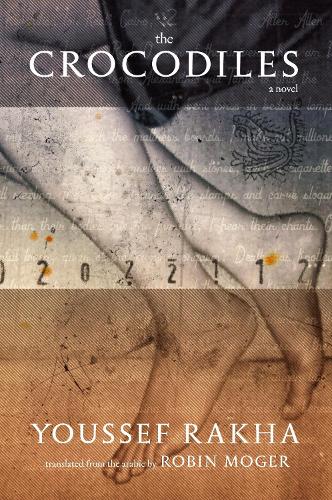
The Crocodiles
(Paperback)
Publishing Details
The Crocodiles
By (Author) Youssef Rakha
Translated by Robin Moger
Seven Stories Press,U.S.
Seven Stories Press,U.S.
15th November 2014
United States
Classifications
General
Fiction
Fiction in translation
892.737
Physical Properties
Paperback
256
Width 139mm, Height 210mm
252g
Description
Set in Cairo between 1997 and 2011, The Crocodiles is narrated in numbered, poem-like paragraphs, set against the backdrop of a burning Tahrir Square. One man looks back on the magical and explosive period of his life when he and two friends started a secret poetry club amidst a time of drugs, messy love affairs, violent sex and clumsy but determined intellectual bravado and retranslations of the Beat poets. Rakha's masterly novel of growth and change which begins with a suicide and ends with a doomed revolution, forcefully captures 30 years in a living, daring and burning Cairo.
Reviews
"In poet/journalist Rakha's brilliant novel, set in Cairo between 1997 and 2011, the suicide of an iconic female activist, the founding of the Crocodiles Movement for Secret Egyptian Poetry by a bunch of young idealists, and the birthday of Nayf, who's struggling to translate Allen Ginsberg's "The Lion for Real," all converge on a single June day. Whether Ginsberg's lion is God or love, revolution or fate, the young people here aren't quite ready, though they're full of talk. The numbered paragraphs read like prose poems and flow like the best fiction."Library Journal
"From its opening depiction of a suicide to its final pages, the author paints a disquieting picture of wild young people who can only look forward to a future that remains unresolved."Publishers Weekly
"Rakha writes with keen authenticity and imbues each scene in thiskaleidoscopic, intelligent, and unconventional novel with unparalleled verisimilitude, essential reading forour turbulent times."Booklist
What happened in Egypt around its second revolution was a mixture of grandeur and pettiness, of sorrow and mirth, of expectation and despair, of theory and flesh. All of which may be found inTheCrocodiles, a novel where reality sheds its veil to reveal its true face that of a timeless mythology. Amin Maalouf, Man Booker Prize-shortlisted author of Samarkand
Youssef RakhasThe Crocodilesis a fierce post-despair novel about a generation of poets who were too caught up in themselves to witness the 2011 revolution in Egypt. Or is it With its numbered paragraphs and beautifully surreal imagery,The Crocodilesis also a long poem, an elegiac wail singing the sad music of a collapsing Egypt. Either way,The Crocodilessuspicious of sincerity, yet sincere in its certainty that poetry accomplishes nothingwill leave you speechless with the hope that meaning may once again return to words.Moustafa Bayoumi, author of How Does It Feel to Be a Problem
"Influenced by Roberto Bolaos ultrarealist group of young poets in The Savage Detectives, and also by the American Beat Generation, Rhakas book is a collage-form account, told in paragraph-length, numbered passages that read like diary entries, about a generation of young writers and artists in Cairo. This novel is exuberant with the passions and energies of youth, and what young people endured to become artists and activists during the Mubarak regime from just before the turn of the millennium until the revolution and disillusioning aftermath of the Arab Spring. The form of it, too, is most welcome, as it can be read in very short bursts without losing anything."Words Without Borders
Youssef Rakha has channeled Allen Ginsberg's ferocity and sexual abandon to bring a secret Cairo poetry society called The Crocodiles to life. He's done something daring and not unlike Bolao in his transforming the Egyptian revolution into a psychedelic fiction thick with romantic round robins, defiant theorizing and an unafraid reckoning with the darkest corners of the Egyptian mentality.Lorraine Adams, author of Harbor
"I found myself absolutely mesmerized by the poignancy and power created by Rahkas unrestrained style; the heightened moments of beauty, despite their sequestration, are beautifully balletic in their structure and come fast and often."Skyler Vanderhoof, The Review Lab
"Think Roberto Bolaos modern classic 'The Savage Detectives,' with its creative sense of plot and pacing, relocated from Mexico City to Cairo. Renegade poets, bursts of violence, sex and love, all of it bubbling over alongside the revolution in Tahrir Square."SFGate
"The Crocodiles . . .revolves around Cairos intellectual and creative circles, particularly those active during the 1990s . . . .Rakha is both totally authentic and original in his creation of language . . . . Taken together, the zombie hordes in [Rakha's earlier novel]The Sultans Sealand the unformed intellectuals ofThe Crocodilescomplete a terrifying vision of dreams broken before they can begin." Ibrahim Farghali,Chronic
Author Bio
Novelist, reporter, poet and photographer Youssef Rakha was a reporter, copy editor, and cultural editor-cum-literary critic at Al-Ahram Weekly, the Cairo-based English-language newspaper, and the founding features writer at the Abu Dhabi-based daily, the National. His work has appeared in English in the Daily Telegraph, the New York Times, Parnassus Aeon Magazine, McSweeney's, and the Kenyon Review, among others. His photographs have been exhibited at the Goethe Institute in Cairo. Seven books by Rakha have appeared in Arabic. He was chosen among the 39 writers representing the new voices of modern Arabic literature at the Hay Festival/Beirut World Book Capital competition, Beirut39 in 2009. His essay, "In Extremis- Literature and Revolution in Contemporary Cairo (An Oriental Essay in Seven Parts)" appeared in the Summer 2012 issue of The Kenyon Review.
